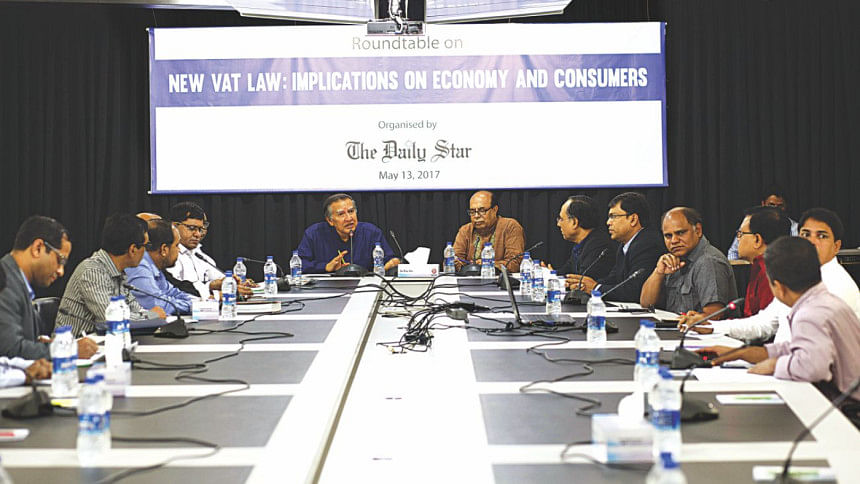New VAT law would also boost income tax collection

Implementation of the new VAT law would not only help the government to earn more from sales receipts but also from income taxes, said top officials of the National Board of Revenue yesterday.
Under the existing system, many businesses can evade VAT because of the lack of records, which ultimately deprives the government of income tax.
"VAT is paid by producers. It is not paid by distributors and retailers, who said they have inadequate knowledge and manpower and cannot maintain accounts," said Jahangir Hossain, member, VAT Policy of NBR, at a roundtable organised by The Daily Star at its office on the proposed VAT law and its implications on the economy.
Representatives from the NBR, consumer rights groups, retailers and importers attended the discussion moderated by Mahfuz Anam, editor and publisher of The Daily Star.
Hossain went to elaborate the much-touted facility of VAT rebate in the new law.
For instance, a producer sells a good worth Tk 100 to a wholesaler at Tk 115, which includes the 15 percent VAT. The wholesaler then sells the good on to a retailer at Tk 125 and a 15 percent VAT, which is equivalent to Tk 18.75, would have to be paid on that price too.
But the wholesaler would have to pay VAT of only Tk 3.75 as he had already paid Tk 15 as VAT to the producer. Similarly, retailers will also get the facility.
"But to get that rebate, a wholesaler and retailer have to keep proper accounts and documents," Hossain said.
In this case, the VAT burden will reduce for sellers, while increasing revenue from income tax as real sales figure would be reflected in the accounts.
The NBR member said the contribution of VAT to revenue collection would increase to 5 percent of the country's gross domestic product in the next four years from 3.5 percent at present.
The NBR's revenue last fiscal year stood at Tk 156,000 crore, with VAT contributing 37 percent, income tax was 36 percent and import duty 27 percent to the sum.
With implementation of the new VAT law, the NBR is trying to bring the informal sector to the formal sector to increase revenue collection and reduce the tax GDP ratio, he added. Khondaker Golam Moazzem, research director of the Centre for Policy Dialogue, said a 15 percent VAT rate is high in context of South Asia.
"It would be better if the rate could be fixed at 10 percent. The proposed VAT rate will have a negative impact on prices in the local markets at least one time," Moazzem added.
Azharul Haque Azad, president of the Fashion Entrepreneurs Association of Bangladesh, echoed the same.
He cited the poor weavers in rural areas as a case in point of the inefficacy of the VAT rebate facility. The inadequately educated weavers cannot present VAT receipts to distributors and retailers as they run very small businesses.
In such cases, the retailers will have to pay the VAT and ultimately, this money is collected from the end users. "It means the prices of local clothing items will go up," Azad added.
The NBR should check VAT evasion rather than hike the rate to increase revenue collection for the state coffer, said Golam Rahman, president of the Consumers Association of Bangladesh. It should also also make clear that the prices of basic commodities and universally used products like electricity will not go up for implementation of the proposed VAT law.
"We the consumers are worried that the prices of commodities will go up in the local market," he added.
The new VAT law will send a revenue shockwave and have an inflationary pressure on the economy, said Md Humayun Kabir, co-chairman of the sub-committee on budget and taxation of the Federation of Bangladesh Chambers of Commerce and Industry.
If the supplementary duty is withdrawn from the next budget, the implementation of the VAT law might not bring equal benefits to the economy and as a result, a good law will turn into a bad one. "The prices of basic commodities will definitely go up in the market and it will be difficult to bring down the prices once it goes up," Kabir added.
The proposed VAT is highly discouraging both for local and foreign investment and the elimination of the supplementary duty will have a negative impact on the local industry, said Abdul Khaleque, convener of the budget committee of the Foreign Investors' Chamber of Commerce and Industry.
For instance, the current VAT on electricity bill is 5 percent and if an additional 10 percent is imposed to make it 15 percent, the price of power will soar, he added.
The cost of doing business will definitely go up due to the new VAT law, said Sabbir Hasan Nasir, executive director of retail chain Shwapno. In many cases, the manufacturers and distributors cannot give VAT receipts, so the retailers have to pay the full VAT. "This means the consumers will pay higher prices."

 For all latest news, follow The Daily Star's Google News channel.
For all latest news, follow The Daily Star's Google News channel. 



Comments